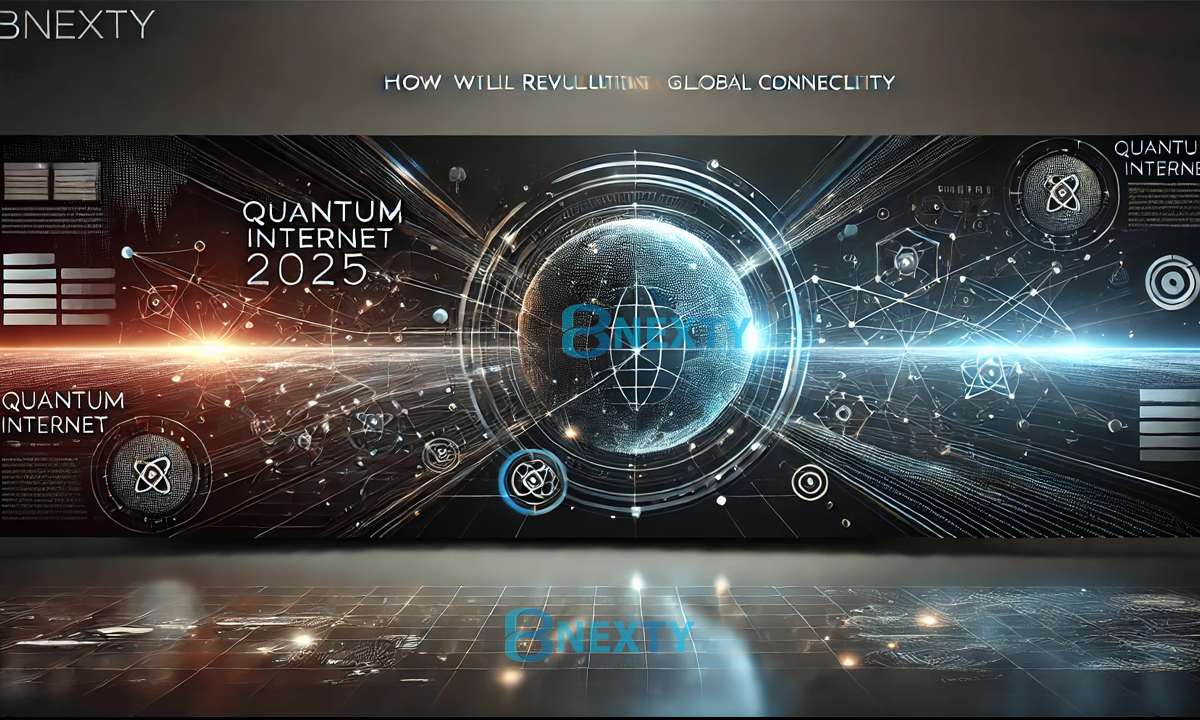Quantum Internet 2025: How It Will Revolutionize Global Connectivity

The Quantum Internet 2025 is set to become the next major technological breakthrough in global communications. Unlike conventional internet, which relies on classical data transfer methods, Quantum Internet uses quantum mechanics to create an ultra-secure and super-fast communication network. With nations like the USA, China, and the EU investing heavily in quantum technology, the race for the most secure internet is well underway.
In this article, we’ll explore how Quantum Internet 2025 will shape the future, its benefits, challenges, and global applications.
1. What is Quantum Internet?
The Quantum Internet is a next-generation network that uses quantum entanglement and quantum cryptography to enable highly secure and ultra-fast data transmission. Unlike traditional internet, where data is transferred through classical bits (0s and 1s), quantum networks utilize qubits, which exist in multiple states simultaneously, enabling superior speed and security.
Key Features of Quantum Internet:
- Unhackable Encryption: Quantum encryption ensures data security through Quantum Key Distribution (QKD).
- Ultra-Fast Data Transfer: Leveraging quantum entanglement, data can be transmitted instantaneously.
- Improved Computing Power: It will enhance capabilities in AI, big data, and machine learning.
2. How Quantum Internet 2025 Will Transform Global Connectivity
The Quantum Internet 2025 will revolutionize multiple sectors by providing unparalleled data security, real-time global communications, and advanced computing capabilities.
Key Sectors Impacted by Quantum Internet:
- Cybersecurity – Quantum encryption will make data breaches virtually impossible.
- Banking & Finance – Secure transactions and fraud-proof financial systems.
- Healthcare & Telemedicine – Ultra-secure patient data sharing.
- Government & Defense – Secure military communications and intelligence sharing.
- Artificial Intelligence & Big Data – Faster data processing for AI applications.
Explore More:
3. Challenges of Implementing Quantum Internet
Despite its advantages, implementing Quantum Internet 2025 comes with challenges:
- High Infrastructure Costs – Requires quantum computing infrastructure and fiber-optic networks.
- Technological Limitations – Quantum repeaters and memory need further development.
- Standardization Issues – Lack of global standards for quantum communication.
- Limited Public Awareness – Educating industries and governments on its potential is necessary.
4. Countries Leading the Quantum Internet Race
Top Nations Investing in Quantum Internet:
- United States – Government-backed projects with tech giants like Google and IBM.
- China – Leading in quantum satellites and encryption technology.
- European Union – Research initiatives in quantum computing and cybersecurity.
- Canada & Japan – Major players in quantum cryptography research.
- India & UAE – Emerging hubs for quantum communication investments.
Read More:
5. Future Applications of Quantum Internet
The Most Promising Use Cases:
- Quantum Cloud Computing – Super-secure cloud data storage.
- Unbreakable Messaging Apps – Advanced encrypted communication.
- Smart Cities & IoT Security – Quantum networks for safer smart devices.
- Advanced Scientific Research – Faster simulations in physics, chemistry, and medicine.
FAQs
1. What is the biggest advantage of Quantum Internet?
The biggest advantage is its unbreakable encryption, which prevents cyberattacks and data breaches using Quantum Key Distribution (QKD).
2. Will Quantum Internet replace traditional internet?
Not entirely. Instead, it will complement traditional networks by enhancing security and speed, especially in sensitive industries like finance, healthcare, and defense.
3. Which companies are leading the development of Quantum Internet?
Top companies include Google, IBM, Microsoft, Alibaba, and Huawei, along with government-backed research institutions.
4. How fast is Quantum Internet compared to traditional internet?
Quantum Internet can achieve speeds significantly faster than fiber optics by leveraging quantum entanglement for near-instantaneous data transfer.
5. When will Quantum Internet be available for public use?
While early versions may be available by 2025, widespread commercial and consumer applications are expected by 2030 and beyond.
Conclusion
The Quantum Internet 2025 is more than just a technological upgrade—it represents a paradigm shift in global communication and cybersecurity. While challenges remain, the advancements in quantum computing, cryptography, and network infrastructure indicate a future where data transmission is faster, safer, and more efficient than ever before.
Governments, industries, and researchers worldwide are investing heavily in this technology, ensuring that by 2025, we could witness the dawn of an entirely new digital era.






